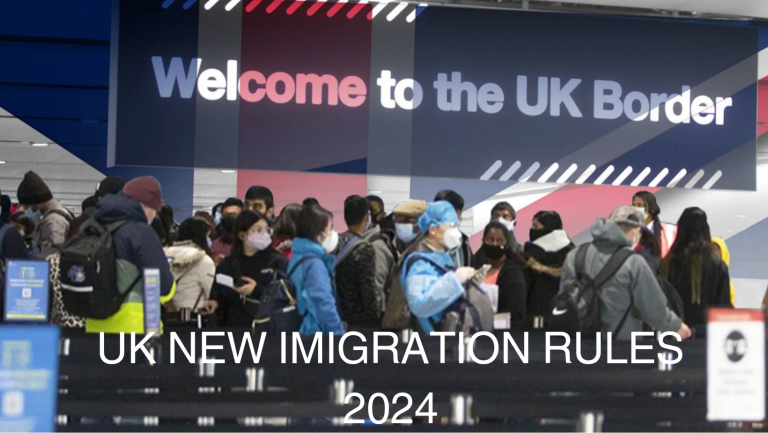
Table of Contents
ToggleThe UK government has announced a series of changes to the immigration system that will affect many people who want to live, work, or study in the UK. The new rules will come into effect in 2024 and will introduce new visa categories, income thresholds, and eligibility criteria for different groups of migrants. In this blog post, we will answer some of the most frequently asked questions about the UK’s new immigration rules and how they will impact you.
Can Health Care Workers Bring Dependents?
One of the major changes that will affect health care workers is that they will not be able to bring their dependents (that is, partners and children) on their visa from 11 March 2024. This applies to all health care workers, except those who are on the Health and Care Worker visa route, which is a special visa category for doctors, nurses, and allied health professionals who work for the NHS or in the social care sector. The Health and Care Worker visa allows applicants to bring their dependants, pay lower visa fees, and be exempt from the immigration health surcharge.
The government has justified this change by saying that it will reduce the pressure on the public services and the housing market, and that it will encourage health care workers to integrate into the UK society. However, many critics have argued that this change will deter skilled and experienced health care workers from coming to the UK, and that it will create a humanitarian crisis for those who are already in the UK and have to leave their families behind.
Can Students Bring Dependents?
Students who want to study in the UK can still bring their dependents if they meet certain criteria. The main criteria are that they must be studying at postgraduate level for at least nine months, or that they must be a government-sponsored student. Additionally, they must show that they have enough funds to support themselves and their dependents during their stay in the UK.
The government has not announced any changes to the student visa rules for dependents, so they will remain the same as they are now. However, students and their dependents will have to pay higher visa fees and immigration health surcharges from 4 April 2024.
Can Skilled Workers Bring Dependents?
Skilled workers who want to work in the UK can also bring their dependents if they meet the minimum salary threshold of £38,700 (or the going rate for their occupation, whichever is higher) from 4 April 2024. This is a significant increase from the current threshold of £25,600, which means that many skilled workers will not be able to afford to bring their families to the UK. However, some occupations, such as education workers on national pay scales, will be exempt from this threshold, and will be able to bring their dependents regardless of their salary. The government has said that this exemption is to recognise the contribution of these workers to the UK society and economy.
Are the New Rules Applicable for Newcomers Only or Who Are Currently Staying in the UK on Another Visa?
The new rules will apply to both new arrivals and those who are already in the UK on another visa and want to switch to a different visa category. For example, if a current UK student wants to switch to a care worker visa, they will not be able to bring their dependents from 11 March 2024. Similarly, if a current skilled worker wants to renew their visa, they will have to meet the new salary threshold from 4 April 2024. However, there are some exceptions and transitional arrangements for some groups of migrants, such as those who are on the EU Settlement Scheme, the Graduate Route, or the Global Talent visa. These migrants will be able to retain their current rights and benefits, and will not be affected by the new rules.
Under Which Visa Category Applicant Can Bring Dependent?
The main visa categories that allow applicants to bring dependents are: spouse/partner visa, skilled worker visa, student visa, global talent visa, innovator visa, start-up visa, and investor visa. However, each category has its own eligibility requirements and minimum income thresholds that must be met. For example, to bring a dependent on a spouse/partner visa, the applicant must have an income of at least £18,600 per year, or have enough savings to meet the financial requirement. To bring a dependant on a global talent visa, the applicant must be endorsed by a recognised UK body as a leader or potential leader in their field of expertise.
The government has not announced any changes to the visa categories for dependents, so they will remain the same as they are now. However, as mentioned above, the visa fees and immigration health surcharges will increase from 4 April 2024.
The UK’s new immigration rules will have a significant impact on many people who want to live, work, or study in the UK. The rules will introduce new visa categories, income thresholds, and eligibility criteria for different groups of migrants, and will affect both new arrivals and those who are already in the UK. The rules will also affect the ability of migrants to bring their dependents to the UK, and will increase the costs of applying for and maintaining a visa. Therefore, it is important for anyone who is planning to come to or stay in the UK to be aware of the new rules and how they will affect them.
